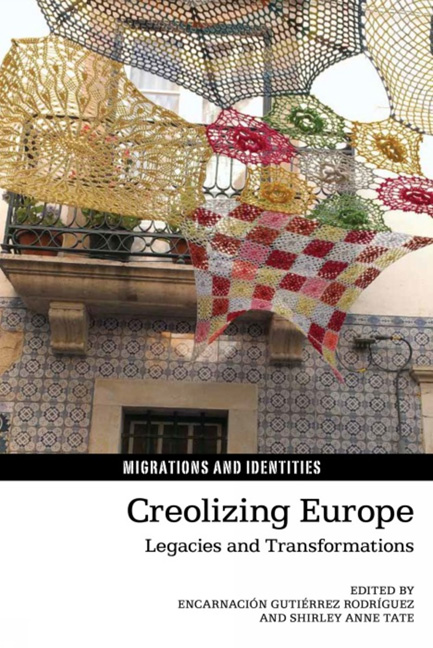Book contents
- Frontmatter
- Dedication
- Acknowledgements
- Contents
- List of Figures
- List of Contributors
- Introduction: Creolizing Europe: Legacies and Transformations
- 1 Creolité and the Process of Creolization
- 2 World Systems and the Creole, Rethought
- 3 Creolization and Resistance
- 4 Continental Creolization: French Exclusion through a Glissantian Prism
- 5 Archipelago Europe: On Creolizing Conviviality
- 6 Are We All Creoles? ‘Sable-Saffron’ Venus, Rachel Christie and Aesthetic Creolization
- 7 Re-imagining Manchester as a Queer and Haptic Brown Atlantic Space
- 8 Queering Diaspora Space, Creolizing Counter-Publics: On British South Asian Gay and Bisexual Men's Negotiations of Sexuality, Intimacy and Marriage
- 9 On Being Portuguese: Luso-tropicalism, Migrations and the Politics of Citizenship
- 10 Comics, Dolls and the Disavowal of Racism: Learning from Mexican Mestizaje
- 11 Creolizing Citizenship? Migrant Women from Turkey as Subjects of Agency
- Index
6 - Are We All Creoles? ‘Sable-Saffron’ Venus, Rachel Christie and Aesthetic Creolization
- Frontmatter
- Dedication
- Acknowledgements
- Contents
- List of Figures
- List of Contributors
- Introduction: Creolizing Europe: Legacies and Transformations
- 1 Creolité and the Process of Creolization
- 2 World Systems and the Creole, Rethought
- 3 Creolization and Resistance
- 4 Continental Creolization: French Exclusion through a Glissantian Prism
- 5 Archipelago Europe: On Creolizing Conviviality
- 6 Are We All Creoles? ‘Sable-Saffron’ Venus, Rachel Christie and Aesthetic Creolization
- 7 Re-imagining Manchester as a Queer and Haptic Brown Atlantic Space
- 8 Queering Diaspora Space, Creolizing Counter-Publics: On British South Asian Gay and Bisexual Men's Negotiations of Sexuality, Intimacy and Marriage
- 9 On Being Portuguese: Luso-tropicalism, Migrations and the Politics of Citizenship
- 10 Comics, Dolls and the Disavowal of Racism: Learning from Mexican Mestizaje
- 11 Creolizing Citizenship? Migrant Women from Turkey as Subjects of Agency
- Index
Summary
Introduction
In ‘We are Creoles’, Édouard Glissant (1989) asserts that the world is permanently changing and creolizing itself. Édouard Glissant sees creolization as a contact of cultures that does not produce a simple métissage. Rather, creolization is a poetics of relation, which, as an ongoing process, is impossible to stop, has no morality, eludes capture and produces unexpected results (Perina, 2009). However, Glissantian creolization overlooks aesthetic creolization in terms of the racialized cultural politics of beauty. Developing a discussion based on aesthetic creolization will be the focus here to enable an assessment of whether or not England has gone beyond simple métissage and is being creolized at the level of such cultural politics.
The crowning of twenty-year-old black ‘mixed race’ Rachel Christie on July 20, 2009 as ‘Miss England’ brought home to the metropole the peculiar racialized cultural politics of beauty instantiated in Caribbean Creole societies during slavery and colonialism. What could Glissant's ‘we are Creole’ mean in aesthetic terms? Did Rachel Christie as Miss England signal a nation that was Creole, that is, one that went beyond métissage to proclaim itself as ‘post-race’? Or were we seeing a creolization where a racialized poetics of relation enables the continuation of white racial hegemony through the beauty pageant as a micro-strategy of aesthetic domination? These questions necessitate that we read ‘race’ as a technology which fixes the body as Other back into Glissantian creolization from the vantage point of Charles Mills's (1997) Racial Contract.
Whilst drawing on Glissant's insights, what will be argued from the vantage point enabled by Mills is that there is a racialized aesthetic poetics of relation in England. This ensures that only that black beauty which is recognized by the nation, that is a ‘mixed race’ one, can be validated. However, it is a validation with provisos which seeks to affirm the nation as creolizing in its present and possible futures. This affirmation aims to take the nation beyond ‘race mixing’, beyond métissage, as here we see a previously racially Othered and troubling body representing the very nation from which it has long been held apart. However, using the ideas of condensation and recycling (Ford, 2010), Christie's body is revealed to be encoded as black through genealogy as well as ‘Venus’ through discourses on hypersexualization, animality and the black woman's body as spectacle.
- Type
- Chapter
- Information
- Creolizing EuropeLegacies and Transformations, pp. 100 - 117Publisher: Liverpool University PressPrint publication year: 2015

